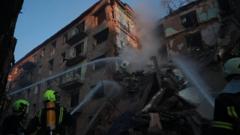The European Union has rolled out its latest sanctions package aimed at undermining Russia’s economy as the conflict in Ukraine continues with no end in sight.
European Union Takes Strong Stance with New Sanctions Against Russia

European Union Takes Strong Stance with New Sanctions Against Russia
Fresh sanctions target Russia’s energy sector amid ongoing geopolitical tensions.
The European Union’s executive branch recently announced a significant sanctions package against Russia, marking a continued effort to exert financial pressure on President Vladimir V. Putin. The proposed sanctions, which are set to undergo deliberation by member states, include a ban on transactions involving the Nord Stream gas pipelines, a key channel for Russian energy supplies to Europe.
One of the main components of this sanctions package is a reduction in the price cap for Russian gas sales on world markets. This initiative is designed to diminish the revenues that Russia relies on, potentially impacting its funding for military operations. Additionally, the new measures aim to take action against Russian banks and the so-called "shadow fleet" – older tankers utilized by Moscow to clandestinely transport oil, aiding the evasion of existing sanctions. These sanctions would also add newly identified vessels to a blacklist.
This represents the 18th round of sanctions issued by the EU since Russia initiated its full-scale military invasion of Ukraine, illustrating a sustained commitment to damaging the economic capabilities of Moscow at a crucial moment in the ongoing conflict. The sanctions come as diplomatic efforts to resolve the situation appear to stall, with recent negotiations in Istanbul yielding minimal results apart from agreements focused on prisoner exchanges.
As the landscape continues to evolve, the EU's measures signal its resolve to hold Russia accountable and strive for greater economic pressure amid the ongoing war.
One of the main components of this sanctions package is a reduction in the price cap for Russian gas sales on world markets. This initiative is designed to diminish the revenues that Russia relies on, potentially impacting its funding for military operations. Additionally, the new measures aim to take action against Russian banks and the so-called "shadow fleet" – older tankers utilized by Moscow to clandestinely transport oil, aiding the evasion of existing sanctions. These sanctions would also add newly identified vessels to a blacklist.
This represents the 18th round of sanctions issued by the EU since Russia initiated its full-scale military invasion of Ukraine, illustrating a sustained commitment to damaging the economic capabilities of Moscow at a crucial moment in the ongoing conflict. The sanctions come as diplomatic efforts to resolve the situation appear to stall, with recent negotiations in Istanbul yielding minimal results apart from agreements focused on prisoner exchanges.
As the landscape continues to evolve, the EU's measures signal its resolve to hold Russia accountable and strive for greater economic pressure amid the ongoing war.






















